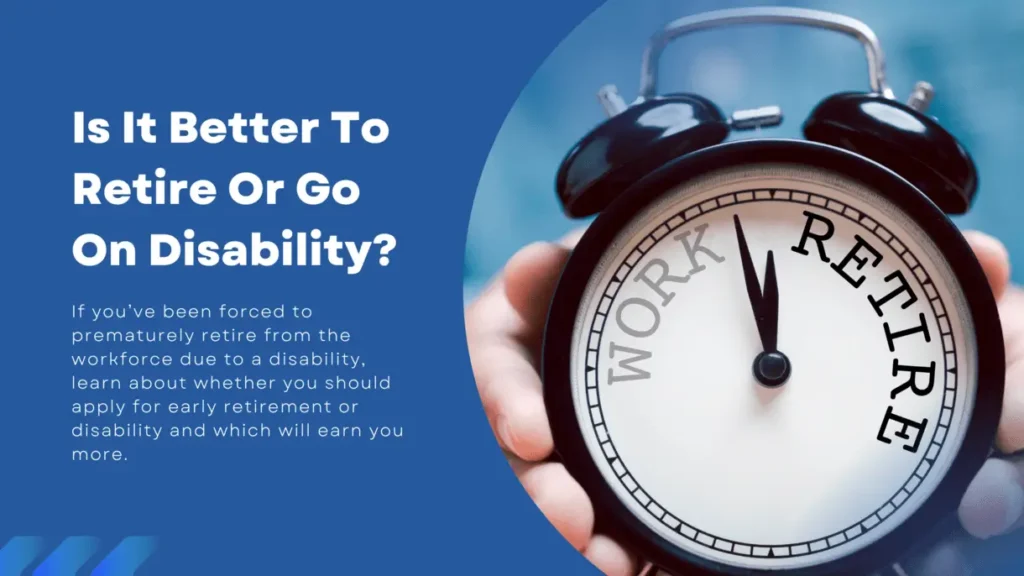A reader wrote in to let us know he’d been turned down for Social Security disability for being “too old.” His question is, “I didn’t know there was an age cut-off when I applied. At what age am I too old to qualify for Social Security disability?” Unfortunately, the real answer depends on whether or not you apply for early retirement. Here’s what you need to know about the age limit for getting Social Security disability benefits and whether it’s better to retire or go on disability.
Ready to see if you may qualify? Click here to get a FREE, no-obligation consultation before starting your claim.
Social Security Retirement vs Social Security Disability: Key Takeaways
- SSDI benefits are for disabled individuals between 18 and full retirement age, whereas Social Security retirement is for people aged 62 and up
- Filing for disability benefits from SSDI instead of retirement benefits can prevent a reduction in your retirement benefits from retiring early
- If you opt for early retirement benefits, you will not be eligible for disability benefits
- SSI disability benefits may be available for individuals who apply for early retirement
- A disability attorney may help you choose the best Social Security benefits and payments for your situation
Difference between SSDI Benefits and Early Retirement Benefits
Social Security retirement benefits are available to individuals who have reached the qualifying age and have worked enough to earn the required number of credits. On the other hand, Social Security Disability Insurance (SSDI) provides benefits to people who are unable to work due to a qualifying disability, regardless of age, as long as they have worked and paid Social Security taxes long enough to qualify. However, there may be an overlap between the two for individuals who are close to retirement age, so it’s important to know if you need disability benefits or retirement benefits.
What Are Social Security Retirement Benefits?
Social Security retirement benefits are monthly checks that partially replace your income when you retire from the workforce, either by working part time or retiring altogether. These retirement benefits can be collected starting at the age of 62, though the current Full Retirement Age (FRA) is 67.
Social Security retirement benefits are determined based on the amount of money you paid into the Social Security fund throughout your working years. Your payment amount is based on a portion of your highest earning years, but to receive your full retirement benefit, you’ll need to wait until you’re 67 years old to retire. You can retire as early as 62 years old and receive early social security benefits, but you will lower your total monthly benefits by doing so.
What Are Social Security Disability Benefits?
Social Security Disability Insurance (SSDI) is a program available for American workers who experienced a disability that prevents them from participating in the workforce. It’s available for anyone between the ages of 18 and their full retirement age who has a substantial work history where they’ve paid into the Social Security fund. If you qualify for SSDI benefits, you’re able to access your Social Security retirement benefits prematurely without lowering the total amount you’ll be offered when you transition to Social Security retirement.
Does Disability Pay More Than Retirement?
In certain circumstances, disability may pay more than retirement, depending on your age and your earnings level across your career. However, it’s just as likely that retirement will pay more, or the same amount as disability benefits.
If you are between the ages of 62 and 67 (Full Retirement Age), disability benefits from Social Security Disability Insurance (SSDI) will likely pay more, as the monthly payment is usually the same as what you’d withdraw at your Full Retirement Age from Social Security retirement benefits. Additionally, if you retired between these ages, you would receive less than your full retirement benefits, which means you would earn less by retiring, as opposed to applying for disability.
If you are 67 or older, you do not qualify for SSDI, and you must draw Social Security retirement benefits. However, you will be eligible for the full amount, meaning you would earn the same amount of money as you would on disability. You may also qualify for Supplemental Security Income (SSI), which could offer additional financial assistance.
If you are between 62 and 67 and are fully disabled, you may still be able to draw retirement benefits while receiving SSI instead of SSDI, but you may need to work with a lawyer to determine if the income you’d receive doing so would match or exceed the amount you would receive on SSDI instead. The monthly benefit amount for SSI in 2025 is $967, whereas the average monthly benefit for SSDI recipients is $1,580, or a maximum of $4,018.
Can a Retired Person File For Disability Benefits?
If you stop working between the ages of 62 and 67 due to a disability, you may be able to file for disability benefits, but only if you haven’t filed for early retirement benefits as well. In fact, it’s advisable to apply for SSDI benefits (Social Security Disability Insurance) in lieu of retirement benefits while you still can, as this will prevent your benefit amount from lowering due to drawing it early.
Can You Collect Early Retirement Benefits and Disability at the Same Time?
If you’re already 62 years old, then you can apply for early retirement benefits from the Social Security Administration. But once you do that, you cannot qualify for Social Security disability. (You can still apply — but there’s zero chance you’ll get approved for disability benefits once you start drawing early retirement.) The bigger concern is how much of your Social Security income you’re giving up for the rest of your life. Let’s say you apply for early retirement at 62. The SSA will reduce your payment 5/9 of one percent for every month prior to your full retirement age. That means your early retirement benefits will be up to 35% lower each month than if you waited until your FRA.
Maybe you’re thinking, Okay, they’re reducing my payments until I reach normal retirement age. Nope! Those early retirement payments stay reduced for the rest of your life. You will never get your full Social Security benefit payment once you start drawing early retirement. But the good news is, disability will pay your full Social Security monthly benefit amount at any age. So, don’t apply for early retirement just yet! Instead, file your claim for Social Security disability benefits. If you cannot get disability, you still have plenty of time to start drawing early retirement.
Why Do You Have To Choose Between Disability or Early Retirement?
Another thing people may not realize is that disability and regular Social Security are the exact same monthly payments. You cannot draw both, because it’s like asking your boss to cut two paychecks for the same work period. Simply put, disability provides some income if your health forces you to stop working for at least 12 months. But that’s only meant to help you bridge the gap until you can start drawing regular Social Security.
In fact, once your Full Retirement Age (FRA) arrives, your disability payments automatically switch over to regular Social Security the following month. You don’t need to fill out any paperwork or forms to make this happen. Your monthly payment amount won’t change, either. However, your deposits may show up on a different day that’s based on your birth month and year. That’s the only difference you may notice after your payments switch from one source to another.
How Early Retirement Impacts Disability Claims
Social Security disability benefits give you the option to draw early retirement before you’re old enough to do so. Congress created this program in 1956 for employees whose health problems force them to stop working at least 12 months. The Disability Insurance (DI) trust only approves applicants age 18-66 with enough Social Security work credits to qualify.
But what if you just turned 62 and applied for early retirement? Remember, SSD is essentially a way to draw early retirement because your health problems make it either difficult or impossible for you to keep working. If you’re approved for early retirement, then you cannot qualify for Social Security disability benefits. That’s because if you qualify for any Social Security benefits at all, your early retirement request will take priority. Once you start drawing early retirement, the SSA automatically denies your Social Security disability claim.
You can apply for early Social Security retirement starting at age 62. However, we recommend applying for Social Security disability instead, since you’ll get paid more if approved. If you’re younger than age 67 and want to triple your chances for disability approval the first time you apply, start your free online claim evaluation now.
At What Age Are You No Longer Eligible to Apply for Social Security Disability?
Haven’t applied for early retirement, but you’re between 60 and 65 years old? Then you’re in luck! You can apply for Social Security disability up until one year reaching before your full retirement age (FRA). Typically, that means you can still get SSD benefit approval before your 66th birthday, if you meet all other requirements. But once you reach your FRA, your SSD benefits automatically convert into regular Social Security retirement payments. That means any claimants age 67 and older cannot qualify for SSD, because they now qualify for regular Social Security.
Supplemental Security Income for Those Aged 65 & Older
If you’ve already applied for early retirement benefits but don’t earn enough to support yourself, you may be eligible for another Social Security Administration program: Supplemental Security Income (SSI).
SSI benefits are designed primarily for individuals over 65, but they’re also available for disabled individuals who can no longer support themselves. SSI benefits may allow for recipients to receive up to an additional $967 monthly in retirement income. Both SSI and SSDI have their role in supporting retirement-age individuals struggling with disability.
To apply for SSI, you’ll need to call your local Social Security office and speak to an agent on the phone. You can find the right number to call by visiting the SSA’s office locator page and entering your current ZIP code. Alternatively, you can also call 1-800-772-1213 Monday through Friday, 7am-7pm EST to apply by phone.
A Disability Attorney Can Help With Your Claim
In the intricate landscape of Social Security payments and benefits, the expertise of a disability attorney can be invaluable. Whether you’re considering disability benefits or early retirement, seeking guidance from a legal professional can ensure that you navigate the process with clarity and confidence. With their assistance, you can make informed decisions that prioritize your financial well-being and secure the support you need for the future.
Ready to see if you may qualify? Click here to get a FREE, no-obligation consultation before starting your claim.

